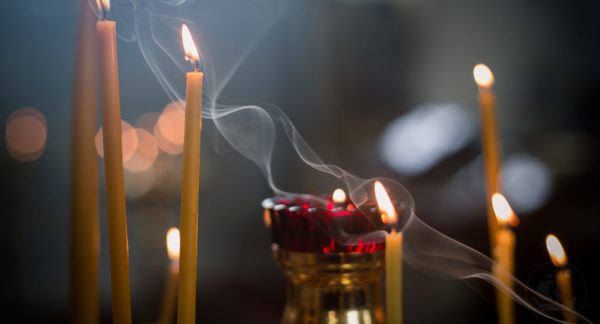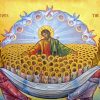Most of us have a deep seated fear of death. How do we overcome it? It is essential for us to seek ways to deepen our faith. We need to develop a faith based on certainty that there is a desirable life after death. We must learn without question that death is the path to having an eternal life in God’s kingdom filled with His love.
We must realize that death is a transition, not an end, that it’s a transition to a new creation where there is no longer any suffering or pain. It is this firm belief and acceptance that Christ in His Resurrection has shown us the true path to Paradise and life in His heavenly kingdom.
This development of a deeper faith will come when ones lives a way of life taught by Christ’s true Church. This is where we are taught the necessary disciplines followed by Christians from the earliest days. This includes, in addition to the healing Sacraments, our prayers, our regular worship, our following the discipline of fasting to overcome our passions, our ongoing study of Holy Scripture and the reading of the writings of the Church Fathers.
We also need to recognize that there is a difference between fear and sorrow. It is normal to have sorrow over the loss of a loved one. This does not necessarily indicate a fear of death. Even Christ cried on hearing about the death of Lazarus. The Church does not forbid tears. We should have sorrow and grieve just like we would if we were bidding goodbye to a loved one embarking on a long and extended journey. Our sorrow should not be extreme though. It should be modest with propriety, calm and controlled.
What attitude is acceptable to God? Extreme wailing is unacceptable and possibly even an insult to God. We must show that we do accept, whatever the circumstances of the death, that all is part of God’s plan for that person. We have to accept the will of God. Excessive grief is an indication of a lack of faith and trust in a loving and merciful God. We need to think of a loved one’s death as the acceptance of an invitation to be with God and that the angels have come to lead them to heaven. It helps for us to think of it as a sleep, a transition, and the beginning of a beautiful journey.
Saint John Chrysostom writes:
“If one must mourn for the death of men, that should be the devil! Let him weep and wail, for we are now freed from his traps and are going toward the greater, the permanent blessings. Fear, terror, weeping, mourning, wailing, and agonizing cries are worthy of his evil and not of you, who are the rational creature of God, You who are destined to be crowned and to rest in eternal blessedness.”
He advises in this way:
Let us gather around those who on the way to the other life. Sit and do not disturb the dead who are before you…calm yourselves and look and see the great mystery.
In silence ask yourselves:What is this great mystery that concerns me? He who was dear to me yesterday is now before me as a horror; what was yesterday a part of me is now seen as a stranger; the one I embraced a while before, I now do not even care to touch. I weep over him as my own, but avoid the decay as not my own.
When you see someone leaving for the other life, be not disconcerted but come and concentrate within yourself, examine your conscience, consider that not long after this the end awaits you too.
The Church in its love and wisdom helps its members see both the present and the future in light of the Gospel. I helps us to understand the meaning of biological life and the meaning of an eternal life gained through death.
Our death is something we should always keep alive in our thoughts. This will help keep us focused on the purpose of our biological life.
















